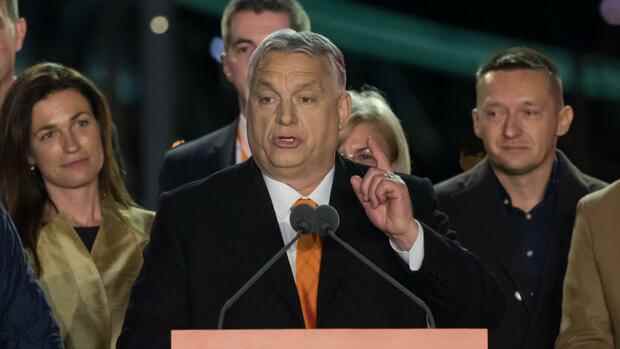In the months leading up to the elections, Orban could not resist handing out election gifts to young and old. For example, residents under the age of 25 no longer pay income tax, retirees received a 13th pension and families received a tax refund.
Apparently cunningly, Orban also waged a fight against inflation. So he had prices frozen, for example for petrol. A liter of fuel in Hungary costs a fixed 480 forints and thus 1.30 euros, which means that the country has the lowest petrol price in Europe. The politician has also lashed down the prices of a handful of groceries and interest rates on adjustable-rate mortgages.
During the election campaign, Orban not only presented himself as a politician who takes care of people’s economic concerns, but also as a guarantor of peace and security. He accused his opponents of wanting to draw the country into the Ukraine war.
Top jobs of the day
Find the best jobs now and
be notified by email.
Obviously, Orban bet on the right issues, otherwise his victory would not have been so clear. After all, the Fidesz party will occupy two-thirds of the parliamentary seats and can thus change the constitution as it sees fit.
costs of the election campaign
It is difficult to find out which arguments were more popular with the voters, the political or the economic. However, Orban will have to pay close attention to the economy in the coming period, because the costs of his election campaign could prove to be overwhelming.
The politician must have hoped that inflation would only be temporary and that the economy would quickly pick up speed again. But it doesn’t look like it: Economic disruptions are usually more persistent than politicians who are fixated on short-term electoral success imagine.
Inflation is more stubborn than Orban may have thought, and the country’s vital auto industry has deteriorated. You are missing parts, such as chips and wiring harnesses. This will weigh on the country’s exports and affect the state budget.
Especially since the election gifts also weigh on the budget. Hungary’s finance minister, Mihaly Varga, has already announced that the budget will have to be adjusted to the likely lower growth rates.
Orban is also faced with the question of how to undo the temporary interventions in the price structure. For example, the interest rates on the variable mortgages were fixed at the level of last October, and the measure is due to expire at the end of June.
>>Read more: Why EU funds are not enough to slow down Orban and Kaczynski
The real estate loans may then be converted into fixed-rate mortgages. But at what rate should that happen? Interest rates will probably be even higher in July than they are at present, especially since the Hungarian central bank is fighting inflation with a tight monetary policy. Property owners need to brace themselves for a shock – or the banks for losses.
fight against corruption
After coming to power for the second time in 2010, Orban pushed Hungary forward economically. From 2015 in particular, the country benefited from the upswing in the global economy and from financial support from the EU.
Orban’s Fidesz party wins elections in Hungary
Not only is the economy weakening today, but the EU is also making no move to release money from the Corona recovery fund. And as it became known on Tuesday evening, the country must also prepare itself for a procedure to cut EU funds.
Ursula von der Leyen, the EU Commission President, announced in the Strasbourg European Parliament that her authority would take the first step in the so-called rule of law mechanism. The European Commission informed the Hungarian authorities about this on Tuesday.
Von der Leyen said: “With Hungary, we made it very clear, the problem is corruption.” The Commission and Hungary had not managed to find a common denominator on this issue.
The EU Commission President sees the problem of corruption in Hungary.
(Photo: AP)
Orban has gathered a circle of 10 to 15 business people around him in recent years. Istvan Janos Toth of the Budapest Corruption Research Center describes this system as favoritism. A striking number of public contracts, which were at least partially financed by the EU, went to people from this circle.
They now dominate large parts of the domestic industry, such as the construction sector or tourism. The best-known figures in this circle include Lörinc Meszaros, a former gas fitter from Orban’s hometown of Felcsut, and Istvan Tiborcz, the prime minister’s son-in-law.
In order for Hungary to actually have EU funds cut, at least 15 EU countries with 65 percent of the population must agree to the measure. Before that, Hungary’s government can comment on the allegations several times. Orban may have won a Pyrrhic victory over the weekend.
More: Why Viktor Orban is weakened despite his election victory
